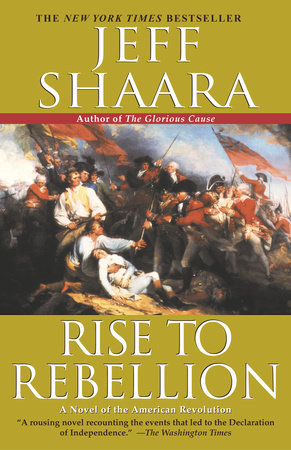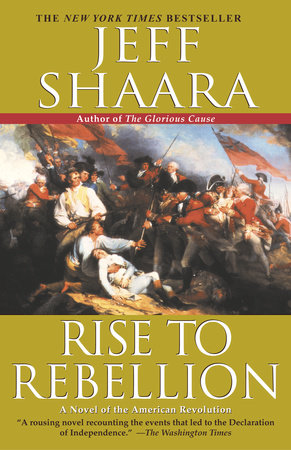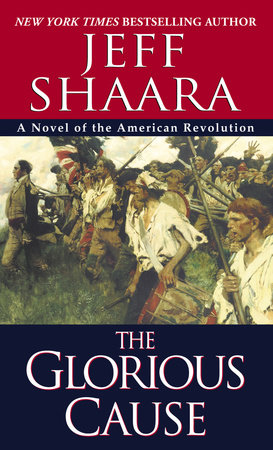Excerpt
Rise to Rebellion
THE SENTRY
March 5, 1770
He had been in Boston for nearly eighteen months, had come ashore with the rest of His Majesty’s Twenty-ninth Regiment after a miserable journey down from Halifax. The troops had been summoned to the boats by their commander, General Thomas Gage, had been told only that they were going to the Massachusetts colony to maintain the peace. Few had any idea how that peace might be threatened, and nearly all saw the journey as an escape from the lonely isolation of the king’s most northern port. When they finally marched out of the cramped warships, they moved into a town where the people did not welcome them, did not provide homes or hospitality. Now, after nearly two years, the conflicts between the citizens of Boston and the soldiers had become more than the unpleasant argument, the occasional barroom brawl. The discipline of the troops had begun to slip; men became frustrated by the hostility around them, the taunts and minor assaults, and when the officers were not close, many of the soldiers had begun to strike back. The citizens had responded to the anger of the troops with anger of their own, and gangs of young men armed with clubs and the occasional saber began to patrol the dark alleys outside the pubs and meeting places of the soldiers. The fights were more numerous now and were sometimes bloody. While the local magistrates were quick to arrest and prosecute, both sides protected their own, and no one had any illusion that the law could protect the innocent. Inspired by the newspapermen, who presented each incident in passionate detail, playing up the seething hostility, the citizens were more and more restless, fueling the growing anger toward the British troops. To many civilians, this military occupation was oppressive, and even those most loyal to the policies of London recognized that the presence of the troops was dangerous; with the right spark, the minor disturbances could explode into a bloody disaster.
His name was Hugh White, and he had served in the Twenty-ninth Regiment for nearly three years. He had little ambition, had no particular designs on promotion, considered the corporal above him to be a far better soldier. He rarely spoke to the officers, was not a face or a name that anyone would ever single out. But today, he had been singled out, given a job that most in his company would dread. The duty was not for punishment of some indiscreet act. It was simply his turn. And so he stood guard in front of the Custom House, shivering against the sharp cold in a small wooden guardhouse, standing sentry to a place that would rarely attract attention.
He moved around as much as the cramped space would allow, touched the walls on three sides of him, felt the rough cold wood. His fingers were numb, and he flexed them, then pushed one hand hard inside his coat. He glanced out beyond the guardhouse and saw only a few citizens moving quickly through the cold, ignoring him. He cast a glance down toward his hidden hand bulging in his coat, flexed his fingers again, worried about being seen. He thought of the drill the week before, the sergeant scolding the men to keep their decorum, maintain their dignity, especially on guard duty. That meant hands by your side. He eased his head outside the guardhouse, looked toward the doorway of the Custom House, saw no one, felt relief. Perhaps even that old sergeant would understand, he thought. It’s just too cold. He put his other hand inside the rough wool, pulled his arms up tight. He blew out a sharp breath, thinking that if he stood up stiff the way they told him to, his fingers would probably fall off.
The musket leaned up against the wall close beside him, a light glaze of frost on the black steel. The guardhouse was really only a narrow box, not much larger than an upright coffin. But it kept away the awful bite of the wind, the sharp cold that blew deep into your bones.
Early that morning, the assignment of guard duty had made him smile, and if the others laughed and teased him, he had only thought of relieving the boredom of the barracks. Now he imagined what the others were doing, playing cards, the profane talk. His father had warned him of the bad influences, and he could still see his mother’s tear-stained face, watching as her boy marched away to join this army. She didn’t want me to go, he thought. They expected me to work that land, still expect me to just come home and be a farmer, like them. They don’t know anything else. He remembered the look on their faces when he had come home, the brief visit before the Twenty-ninth had boarded the great ship to sail West. He had stood tall, waited as his father moved around him, inspecting the uniform, even touching the dull red coat, could still see his mother’s shock, her young boy now grown into this soldier. Their response had disappointed him. They had not seemed as proud as he had expected, seemed more worried instead, gave him more sharp scolding to keep himself clean, to avoid the awful deadly temptations that only a parent fears. I wish they could see me now, he thought. This is important, guarding the Custom House.
He hadn’t even been inside the building, but he knew the rumors. There was supposed to be a huge vault filled with silver, the customs duties paid by the ships as they brought their goods into the port from England or from the islands far to the south. He hoped it was true, had no reason to doubt the importance of his duty, was proud of his responsibility, guarding the king’s currency. If those chaps back in the barracks knew how much this post means to the king, they wouldn’t laugh, they’d be out here, doing the duty. He glanced at the musket, then out again to the wide street, the hard-packed ice and snow, heard the stiff breeze whistling through the cracks in the crude wooden walls of the guardhouse. He wanted to drift away, tried to imagine the scene: Private White, holding away the bandits with his bayonet, ordering the riffraff to move away, and his mind spoke out, the voice loud and firm, In the name of the king . . .
He shivered now, and the image would not stay. He wriggled his fingers again, glanced toward the street once more. The locals didn’t much care for them, he knew. He wasn’t educated in politics; few of the private soldiers were. They had been surprised at the hostility from many of the citizens, and when they had marched away from the ships, they had been told that they would have to camp on Boston Common, since there were no open doors for them in private homes. But camping outdoors in tents could be deadly through the New England winter, and the commanders had struggled frantically to find accommodations. Finally, those in the town whom the officers called Tories and who did not seem so resentful of the troops began to open their doors, leasing buildings and warehouses, some even renting out their own homes. Now two winters had passed, and the duty was mostly monotonous, painfully boring. He had spent much of his time simply standing at drill in the common, marching in formation, parading in line down the side streets. He stamped his cold feet and wondered why so many of these people hated the British so. All we do is march around.
Many of the soldiers had begun to seek part-time work in the town, some spending their off-duty hours working jobs that would ease the boredom and provide a little more cash than their low army pay. But there was resentment for that as well, the citizens protesting that the troops were taking valuable jobs badly needed by the men of Boston. It was not long before the resentment turned violent. He had seen some of the fights, most inspired by strong drink, a sudden and accidental confrontation in an alley or outside a pub. But the violence had continued to grow, the fights larger, and men on both sides had seemed to organize just a bit, small gangs of citizens and troops, both looking for some satisfaction, some way to relieve the constant hostility. He had seen the man with the bloody wound, three nights ago, the first real wound he had ever seen. He thought of the man—John Rodgers, another young private—his skull split open. The anger in the barracks had brought the officers in, stern words, threats of punishment. But even the soldiers who had not been a part of the fights knew that there would be more violence.
He had endured the insults himself, knew better than to walk the streets alone, even off duty, out of uniform. He still didn’t understand the anger. We’re just keeping the peace. He said the words again in his mind, the first orders he had heard, even before they left the ship. Keep the peace.
He moved his legs, stepped in place, tried to relieve the numbness in his feet. He leaned out past the protection of the guardhouse, felt a stiff breeze on his face, pulled back inside. It’s pretty peaceful tonight. Too cold for the officers, that’s certain. They’re all inside, probably eating their hot food. He could see the main guard building, and down the street the headquarters for His Majesty’s forces. He felt a rumble in his stomach, began to think of the supper that waited for him back in the barracks. He could use a cup of tea right now. He tried to imagine the steam rolling up on his face, but the wind suddenly blew hard against the guardhouse, and now he could hear something else, voices, shouts. He leaned outside again, saw a group of men moving in the street, turning toward the Custom House. He watched them, counted maybe a dozen, then saw more men coming around a corner a block down the street. He had been warned about the gangs, all the troops understanding that they were targets for the bands of rough young men. He shivered again, made two tight fists inside his coat, watched the men moving across the street, coming closer to the Custom House. Now the voices were clear, and he saw one man point at him, felt his heart jump in his chest. They began to move straight toward the guardhouse, straight toward him. He pulled his hands from his coat, reached down, gripped the musket, leaned it up on his shoulder. Make a good show, he thought. No one will get past. They will not dare. He watched them move closer, realized they were young, teens perhaps, saw one bend down, scooping up the snow, rolling an icy ball in his hands. There were more shouts, and suddenly the boy threw the snowball at the guardhouse. White flinched, heard the dull smack against the wall, felt his heart pounding, said aloud, “Move along now. This is no place for play.”
The faces were all looking at him, and he expected to see smiles, the playfulness of boys, but there was something new, unexpected, anger, and now more snowballs began to fly. The boys moved closer, their aim more true, and he felt a splatter of snow against his chest. The laughter came, but they did not move away, the fun was not over.
White stepped outside the cover of the guardhouse, felt his own anger rising, looked at the faces, the voices jeering, calling out to him. One boy suddenly lunged closer, and White watched his hands, expecting something, another snowball, but the boy said, “What kind of man are you? A filthy lobster-back!”
White tried to ignore the boy, glanced again at the door of the Custom House, saw the door open slightly, faces peering out, the door closing again. White began to move toward the steps at the doorway, but the boy jumped in front of him, close, reached out and grabbed at the uniform, began to shout, “Dirty lobster-back,” and White swung the musket around, the butt striking the boy’s face. The boy fell backward, a sharp cry, and now there was silence from the mob as White stared at the boy. My God, stop this. He moved up the steps of the Custom House, close to the doorway, saw the young faces watching him, could see out past the mob now, more men coming forward, older men, some in suits, staying back, watching. He felt his hands shaking, tried to grip the musket, shouted, “Leave this place! Move away!”
The injured boy was crying, shrieking, “You dirty scoundrel! I’ll see you dead!”
The voices began to answer, more curses, the boys moving closer again. The snowballs resumed, hitting the door of the Custom House, and suddenly something dark flew past his head, a thick piece of wood, making a sharp cracking sound against the wooden door behind him. He shouted again, “Back! Stay back!”
He could feel his hands shaking, the icy numbness giving way to a rising wave of fear. The jeers from the mob were growing louder, and the officer’s words suddenly came to him again: Keep the peace. He clamped the musket under one arm, his hands still shaking, reached inside the cartridge box at his waist. He felt the stiff paper with his numb fingers, fought through the pounding in his chest, the training taking hold, the fear giving way to the deliberate motion. He tore at the tip of the paper cartridge, poured powder into the pan at the breech, clamped down the lock. He set the butt of the musket down on the step, slowly slid the cartridge into the barrel of the musket, prodded it down the long barrel with the ramrod. Now he pulled out the bayonet, slid it hard on the barrel, a sharp twist, and lowered the barrel, pointed it out toward the crowd. His heart was racing, and he felt a surge of strength, the fear growing into raw excitement. He expected to see the fear in their faces, the respect for the soldier with the loaded musket, the great strength of the army, but the voices were louder still, and now another stick struck the door behind him. He could see more sticks, the crowd moving slowly forward, one voice shouting, “Shoot us! Go ahead, shoot us! You coward! Shoot us and be damned!”






